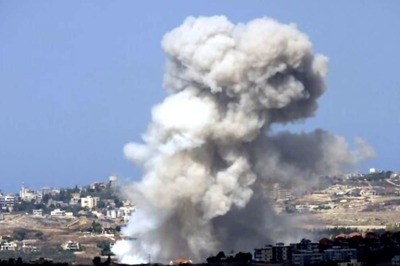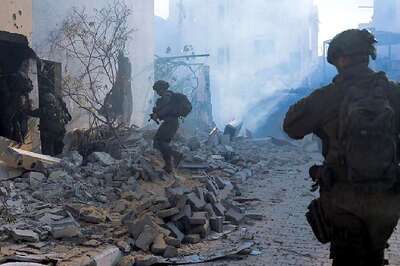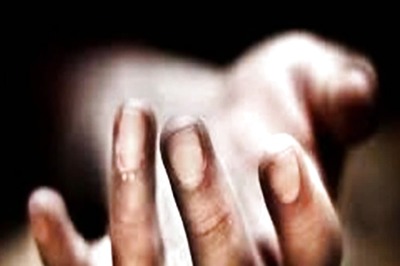
views
WASHINGTON/MOSCOW: U.S. President Joe Biden warned Russian President Vladimir Putin on Tuesday the West would impose “strong economic and other measures” on Russia if it invades Ukraine, while Putin demanded guarantees NATO would not expand further eastward.
The two leaders held two hours of virtual talks on Ukraine and other disputes in a video call about U.S.-Russian relations, which have sunk to their lowest point since the end of the Cold War more than three decades ago.
The Kremlin, which said before Tuesday’s meeting that it did not expect any breakthrough, has denied harbouring any intention to attack Ukraine and has said its troop posture is defensive.
U.S. officials said before the video conference that Biden would tell Putin that Russia and its banks could be hit with the toughest sanctions yet if it attacks Ukraine.
Sanctions, which one source said could target Russia’s biggest banks and Moscow’s ability to convert roubles into dollars and other currencies, are designed to dissuade Putin from using tens of thousands of troops massed near the Ukrainian border to attack its southern neighbour.
“Things we did not do in 2014 we are prepared to do now,” U.S. National Security Adviser Jake Sullivan told reporters after the call, referring to Russia’s annexation of Crimea from Ukraine.
Biden was “direct and straightforward” with Putin, Sullivan said, telling the Russian leader that the United States and European allies would provide additional defensive capabilities to Ukraine, as well as beef up NATO allies in the region.
“There was a lot of give and take, there was no finger-wagging, but the president was crystal clear where the United States stands on all of these issues,” Sullivan said.
The Kremlin said Putin told Biden it was wrong to put all the responsibility on Russia’s shoulders for current tensions.
Moscow has voiced rising irritation over Western military aid to Ukraine, a fellow former Soviet republic that has tilted towards the West since a popular revolt toppled a pro-Russian president in 2014, and what it calls creeping NATO expansion.
RUSSIA WANTS GUARANTEES
The Kremlin said Putin told Biden he wanted reliable, legally binding guarantees against NATO expansion further eastward and complained about NATO attempts to “develop” Ukrainian territory.
Putin also called for guarantees that offensive strike systems would not be deployed in countries close to Russia, according to the Kremlin.
Both sides agreed to continue contacts and directed their teams to consult on questions about Ukraine.
Biden reiterated U.S. support for Ukraine’s sovereignty and territorial integrity, the White House said, and called for de-escalation and diplomacy.
Russian TV footage showed Biden and Putin greeting each other in a friendly manner at the start of the virtual summit.
Both sides say they hope the two leaders can hold an in-person summit to discuss ties between the two nations, which have long-standing differences over Syria, U.S. economic sanctions and alleged Russian cyber attacks on U.S. companies.
A Ukraine official said after the talks Kyiv was grateful to Biden for his “unwavering support”.
A U.S. Congress defense bill released after the talks included $300 million for Ukraine’s military.
Washington has accused Russia of massing troops near the border with Ukraine to intimidate an aspiring NATO member, suggesting it could be a repeat of Moscow’s 2014 playbook, when it seized the Black Sea peninsula of Crimea from Ukraine.
Moscow has questioned Ukrainian intentions and said it wants guarantees that Kyiv will not use force to try to retake territory lost in 2014 to Russia-backed separatists, a scenario Ukraine has ruled out.
For the Kremlin, the growing NATO embrace of neighbouring Ukraine – and what it sees as the nightmare possibility of alliance missiles in Ukraine targeted against Russia – is a “red line” it will not allow to be crossed.
WESTERN ALLIES ENGAGED
Leaders from Britain, the United States, France, Germany and Italy spoke on Monday and “agreed to stay in close touch on a coordinated and comprehensive approach in response to Russia’s military build-up on Ukraine’s borders”, the White House said.
The Russian rouble weakened slightly on Tuesday, with some market analysts predicting the talks would de-escalate tensions and others saying that the U.S. sanctions threat eroded hopes of finding common ground.
Should Russia invade Ukraine, the Biden administration has discussed targeting Putin’s inner circle but no decision has been made, a U.S. source said.
Sanctions against the biggest Russian banks, and curbing the conversion of roubles into dollars and other currencies, were also being considered, another source said.
U.S. officials have told members of Congress they have an understanding with Germany about shutting down the Nord Stream 2 pipeline if Russia invades Ukraine, a senior congressional aide said.
The United States has evaluated the possibility of curbing investors’ ability to buy Russian debt on the secondary market, a measure that even if taken only by Washington was seen as having a severe impact on Russia’s government, according to a person with direct knowledge of the matter.
Washington could target the Russian Direct Investment Fund as well.
CNN reported that sanctions could include disconnecting Russia from the SWIFT international payment system used by banks around the world, an extreme step that would likely require coordination with allies.
German Gref, the chief executive of Russia’s top bank Sberbank, on Tuesday called that idea “nonsense” and “impossible to execute”.
The White House declined to comment.
Ukraine and NATO powers accuse Russia of building up troops near the border, sparking fears of a possible attack. Moscow denies any such plan and accuses Kyiv of massing its own forces in its east, where Russian-backed separatists control a large swathe of Ukrainian territory.
The United States has urged both countries to return to a set of largely unimplemented agreements signed in 2014 and 2015 which were designed to end the conflict in eastern Ukraine.
(Additional reporting by Idrees Ali and Trevor Hunnicutt in Washington, Gleb Stolyarov, Dmitry Antonov, Alexander Marrow, Tom Balmforth and Katya Golubkova in Moscow, Michelle Nichols at the United Nations; Editing by Heather Timmons, Alistair Bell and Mark Heinrich)
Disclaimer: This post has been auto-published from an agency feed without any modifications to the text and has not been reviewed by an editor
Read all the Latest Politics News here




















Comments
0 comment